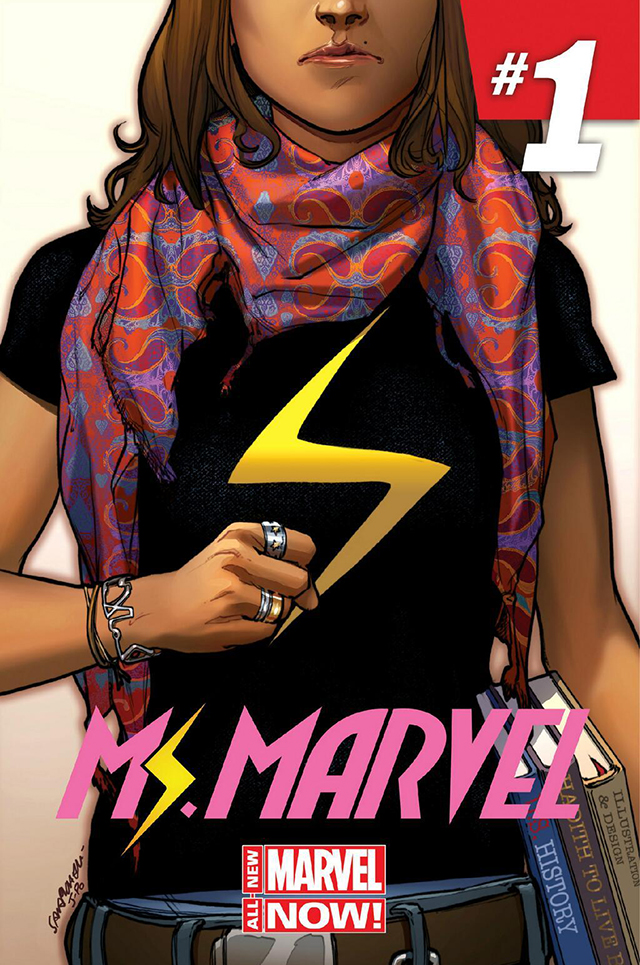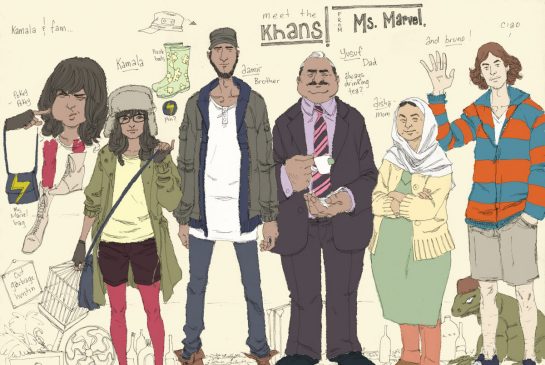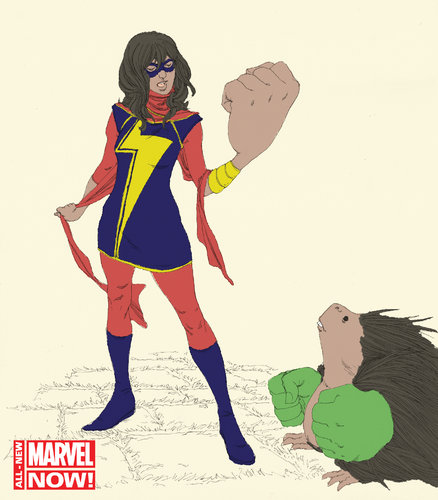The New Ms. Marvel Is A Muslim Girl From New Jersey
When Ms. Marvel returns to Marvel Comics in February, she won't look much like the blond-haired, blue-eyed soldier you remember. In fact, she won't look like most other superheroes at all.
The publisher announced this week that they would launch a new series built around Kamala Khan, the next character to take on the Ms. Marvel moniker held by Carol Danvers before she refashioned herself Captain Marvel. What makes Khan pretty unusual in the comic book universe is that she's a Muslim teenager from Jersey City. Hit the jump to get a first look at Marvel's newest do-gooder.
Kamala's superhero identity is no coincidence. Kamala, whose family is of Pakistani descent, is described as a devoted follower of the Carol Danvers. Upon discovering her new superpowers, including an ability to shapeshift, Kamala decides to take on Danvers' old identity as Ms. Marvel. "Captain Marvel represents an ideal that Kamala pines for," Wilson explained. "She's strong, beautiful and doesn't have any of the baggage of being Pakistani and 'different.'"
When not battling bad guys, Kamala will face conflicts with her family, including an "extremely conservative" brother, a dad who pushes her to become a doctor, and a mom who tries to keep her away from boys lest she get knocked up. She'll also struggle with her faith, as she feels the tension between her religious beliefs and her superheroic duties.
While Kamala isn't the first Muslim superheroine (Faiza Hussain, Monet St. Croix, and Sooraya Qadir are among those who came before her at Marvel), it's still refreshing to see a mainstream comic book lead who falls outside the typical straight, white, male, Judeo-Christian mold. Particularly as the sheer diversity of the Marvel universe — it includes not just humans of all stripes, but aliens, gods, and what have you — is a huge part of its appeal.
However, Kamala's creators are aware that there could be some pushback. "Any time you do something like this, it is a bit of a risk," Wilson said. "You're trying to bring the audience on board and they are used to seeing something else in the pages of a comic book." Amanat added, "I do expect some negativity, not only from people who are anti-Muslim, but people who are Muslim and might want the character portrayed in a particular light."
Indeed, there are always a few vocal detractors whenever a big change comes to an established property. Just look at the complaints over Marvel's black Hispanic Spider-Man Miles Morales, for example, or the bickering over whether or not Michael B. Jordan's blackness disqualifies him to play the Human Torch in Josh Trank's Fantastic Four.
But for non-white kids (or even adults) who've grown up on white superheroes, Kamala represents an exciting opportunity to see themselves and their own experiences represented on the page. Which isn't to say that Kamala's specific cultural background will make her inaccessible to non-Muslim readers, if Wilson and her team do their jobs.
"I wanted Ms. Marvel to be true to life, something real people could relate to, particularly young women," said Wilson. "High school was a very vivid time in my life, so I drew heavily on those experiences: impending adulthood, dealing with school, emotionally charged friendships that are such a huge part of being a teenager."
Meanwhile, as Marvel's comic book world gets more diverse, its cinematic counterpart still has some catching up to do. Aside from a handful of supporting characters, the MCU is still overwhelmingly white. (And to be fair, it's not like DC / Warner Bros. or Fox are much better on this front.) But if Kamala proves popular enough, who knows — maybe she'll even to cross over into the movie universe someday. We know Marvel Studios has already seen a script for a Ms. Marvel movie, after all...
Check out some art from the new title Ms. Marvel, including the cover of the premiere issue, below.



